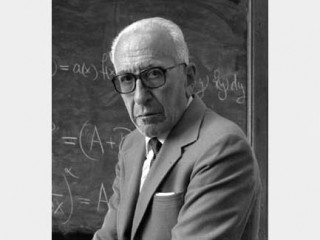
Calderón, Alberto biography
Date of birth : 1920-09-14
Date of death : 1998-04-16
Birthplace : Mendoza, Argentina
Nationality : Argentine
Category : Arhitecture and Engineering
Last modified : 2010-04-22
Credited as : Argentine mathematician, theory of singular integral operators,
0 votes so far
He is known for his contributions to mathematical analysis and the development of singular integrals, which are crucial to pure mathematics and to the mathematical description of physical functions, such as heat conduction and sound transmission. With his mentor Antoni Zygmund he formulated the Calderón-Zygmund theory of singular integral operators and inspired the Calderón-Zygmund, or Chicago, school of mathematicians devoted to their study. In particular Calderón wanted to describe a calculus for elliptic differential operators; from this beginning in the 1950s, the theory of pseudodifferential operators grew in the 1960s.
Calderón's influence on analysis and related areas is due in large part to the many methods that he invented and perfected. Calderón's techniques have been absorbed as standard tools not only of harmonic analysis and but also of nonlinear analysis, partial differential equations, complex analysis, and even signal processing and numerical analysis.
During his career he held academic posts at Ohio State University, the Institute for Advanced Study, Princeton, the Massachusetts Institute of Technology and the University of Chicago, from which he retired in 1985. He was awarded many prizes for his work including the Bôcher Memorial Prize in 1975, the Wolf Prize in 1989, and the National Medal of Science in 1991. Calderón has an Erdős number of 3.
The Calderón prize of the Inverse Problems International Association is named in his honor.
















